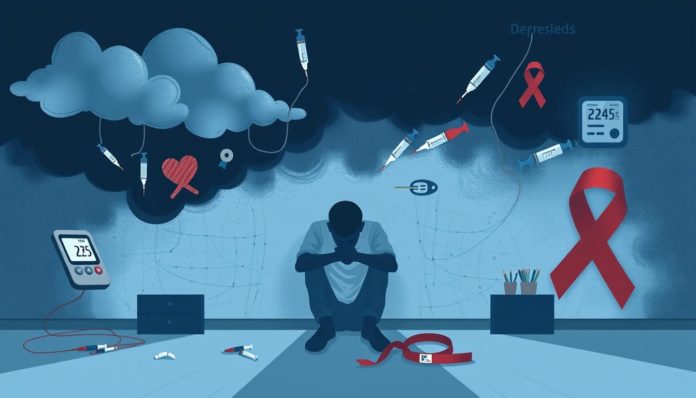Did you know people with diabetes are twice as likely to have depression? This fact highlights the important link between mental health and managing chronic illnesses. It shows why we need to pay attention to both conditions together.
Managing diabetes is not only about watching your blood sugar and following a diet. It also brings emotional challenges that could lead to depression. On the other hand, tackling depression can impact how you manage diabetes. This creates a cycle where each problem can make the other worse. Knowing about this connection is key to managing chronic illnesses better and boosting mental health.
Introduction to Depression and Diabetes
It’s important to know how depression and diabetes are linked. This can help in taking care of your health. These two conditions often happen together, making health issues more complex.
The connection between mental health and chronic illness makes things harder for patients. It is crucial to manage and treat these issues well.

What is Depression?
Depression is a serious mental health issue. It causes long periods of sadness and a lack of interest in life. It affects millions around the globe. It can change how you think, act, and feel.
This condition lowers the quality of life. Due to its ongoing nature, people need long-term care and help from doctors.
What is Diabetes?
Diabetes is a serious chronic illness. It happens when blood sugar is too high for too long. Insulin issues cause it. There are two kinds: Type 1 diabetes and Type 2.
Type 1 is an autoimmune problem. Type 2 relates to how we live and eat. Both types need careful control. This prevents bad health effects like heart or kidney problems.
The Relationship Between Depression and Diabetes
Depression and diabetes are closely linked, affecting people’s health and happiness. Those facing both problems have extra challenges. These issues can make it hard to manage diabetes and hurt mental health too.

How Depression Affects Diabetes Management
Depression can disrupt key daily routines needed to manage diabetes well. It may cause people to exercise less, eat poorly, or skip medicine. This can result in unstable blood sugar and more health risks.
Depression might also make it difficult to recall doctor visits or stick to treatment plans. So, it’s crucial to care for both mental and physical health in diabetes patients.
How Diabetes Can Lead to Depression
Dealing with diabetes itself can be very stressful. Continuous blood sugar checks and strict diets may lead to emotional strain. Over time, this stress can make depression more likely.
Diabetes can also cause pain and uncertainty, leading to despair and frustration. Therefore, treatments should focus on both diabetes control and mental health support.
Let’s look at how these conditions affect each other:
| Aspect | Impact of Depression on Diabetes | Impact of Diabetes on Depression |
|---|---|---|
| Adherence to Treatment | Reduced motivation to follow medical advice | Constant stress from managing the condition |
| Physical Activity | Decreased energy and willingness to exercise | Lack of activity due to fluctuating blood sugar levels |
| Diet Management | Poor dietary choices and eating habits | Diet restrictions can cause frustration and anxiety |
| Mental Health | Exacerbation of mental health issues | Development of psychiatric conditions |
Symptoms Overlap of Depression and Diabetes
It’s vital to know how depression and diabetes symptoms overlap. Many symptoms are common to both, which confuses diagnosis. Awareness and medical advice are key to handling these illnesses better.
Common Symptoms
Depression and diabetes share symptoms like:
- Chronic fatigue
- Changes in appetite
- Difficulty concentrating
These shared symptoms might lead to missing one problem while focusing on the other.
Distinguishing Between the Conditions
To tell apart depression and diabetes symptoms, you need deep knowledge of both. Fatigue in diabetes might bring extreme thirst and lots of bathroom visits. Yet, fatigue from depression comes with sadness and disinterest in life.
Diagnosing and treating these issues properly means a complete medical check. Doctors must consider both mind and body signs for correct diagnosis and treatment.
Risk Factors for Developing Both Conditions
Understanding the risk factors for depression and diabetes is key. Several factors mix together, connecting mental health with chronic illness.
Genetic predispositions play a big role as a risk factor. Studies show that having depression or diabetes in your family means you’re more likely to get both. It’s vital to know your family’s health history.
Lifestyle factors, like eating poorly, staying inactive, and not exercising matter too. Bad eating and no exercise can lead to both diabetes and mental health problems. These are things you can change, showing how living healthy helps.
Psychosocial stressors also matter. They include ongoing stress, trauma, and being alone. These can start mental health issues and metabolic problems that cause diabetes. It’s important to deal with these stressors to lessen both conditions.
| Risk Factor | Impact on Depression | Impact on Diabetes |
|---|---|---|
| Genetic Predispositions | Higher susceptibility | Increased risk |
| Lifestyle Factors | Potential mental health decline | Metabolic changes |
| Psychosocial Stressors | Increased mental strain | Elevated blood sugar levels |
Recognizing these risk factors is the first step toward action. It helps in tackling the link between mental health and chronic illness.
Diagnosing Depression in Diabetes Patients
Finding depression in diabetes patients is key for full care. With screening methods, doctors can spot depression early. This leads to improved health. Here are some important points in diagnosing depression in diabetes patients.
Screening Methods
Screening blends questionnaires and talks with doctors. Tools like the Patient Health Questionnaire (PHQ-9) or Beck Depression Inventory (BDI) check mental health. These screening methods find depression quickly.
Importance of Early Detection
Catching depression early is vital in diabetes care. It makes managing diabetes better. Treating both mind and body together leads to better patient life. Using screening methods helps catch depression sooner. This lowers the chance of more health issues.
Impact of Depression on Diabetes Complications
Depression greatly impacts how diabetes is managed and its complications. It shows the importance of including mental health in diabetes care to avoid serious health complications.
Potential Health Issues
Depressed patients often struggle to follow their diabetes care plans. This can result in poor control of blood sugar. Such neglect increases the risk of several health issues.
Problems include nerve damage, loss of vision, and kidney disease. A study found that depression raises the risk of heart problems in diabetes patients.
Long-term Implications
The lasting impact of not managing depression and diabetes is major. Chronic depression makes it hard to manage diabetes daily. This can lead to consistently high blood sugar and raises the chance of serious complications as time goes on.
Knowing these risks helps us focus on better mental health and diabetes management.
| Health Complications | Impact |
|---|---|
| Cardiovascular Disease | Increased risk due to poor diabetes management and inflammation |
| Kidney Disease | Higher prevalence in those with depressive symptoms |
| Neuropathy | Exacerbated by high blood glucose levels |
| Vision Loss | Linked to prolonged hyperglycemia and depression |
Mental health support in diabetes care is key. It significantly betters health now and in the future.
Coping Strategies for Managing Depression and Diabetes
Managing depression and diabetes together needs good coping strategies. Mixing mental health support with diabetes management helps a lot.
Starting with life changes is key. Eat balanced meals, exercise regularly, and sleep well. These habits boost your mental and physical health. Also, join diabetes self-management programs. It helps you control diabetes and improves mood.
Having people to support you is critical. This includes doctors, family, and friends who get your struggles. Getting mental health support from a therapist brings extra help and comfort. It leads to a more positive outlook on life.
Relaxation methods like meditation, yoga, or deep breathing help too. They reduce stress and anxiety. These methods support your other coping techniques, giving a full approach to managing diabetes management.
“It’s important to address both mental health and diabetes management simultaneously for better outcomes,” emphasizes the Mayo Clinic.
With these coping strategies, dealing with depression and diabetes becomes easier. It leads to a healthier and happier life.
Treatment Options for Dual Diagnosis
Dealing with both depression and diabetes at once needs a well-rounded plan. Tackling both the mind and body parts together leads to better health. By doing this, people can really upgrade their lives.
Medication Management
Treating both illnesses usually means being precise with medicines. For diabetes, people might take insulin or pills to keep blood sugar in check.
For depression, doctors often prescribe medicines like SSRIs or SNRIs. Staying on these medicines is crucial for getting healthier. It’s important to team up with doctors. This helps in handling both sicknesses without the medicines clashing.
Therapy and Counseling
Besides medicine, therapy plays a big role. Cognitive Behavioral Therapy (CBT) is super good for dealing with depression. It also helps in changing lifestyles needed for controlling diabetes.
Counseling offers a safe space to talk about problems and find ways to deal with them. Mixing therapy with the whole plan boosts mental health. This makes it simpler to stick to good routines and follow medicine schedules.
FAQ
What is Depression?
Depression is a serious condition that affects the mind. It makes people feel very sad, hopeless, and uninterested in life. This can make everyday activities hard to do.
What is Diabetes?
Diabetes is when your blood sugar is too high for too long. This happens if the body can’t make or use insulin well. People with diabetes need to manage it to stay healthy.
How does Depression affect Diabetes management?
Depression can make it hard to take care of your diabetes. It might stop someone from exercising or going to doctor’s appointments. It can also make it tough to remember to take medicine.
Can Diabetes lead to Depression?
Yes, dealing with diabetes can be stressful. Worrying about blood sugar and health issues can make someone feel depressed.
What common symptoms are shared by Depression and Diabetes?
Both can make you feel very tired, change your appetite, and make it hard to focus. This makes it tough to know which one you might have without a doctor’s help.
How can one distinguish between the symptoms of Depression and Diabetes?
A doctor can tell the difference by looking at your symptoms closely. They use tests and questions to figure out the cause.
What are the risk factors for developing both Depression and Diabetes?
Things like family health history, how you live (like what you eat and if you exercise), and stress can affect your risk. Knowing these can help prevent these conditions or catch them early.
How is Depression diagnosed in Diabetes patients?
Doctors use questionnaires and talks to check how you’re feeling. Finding depression early can help a lot in managing diabetes better.
Why is early detection of Depression important for Diabetes care?
Finding depression early helps treat both your mind and body. This means better diabetes control and feeling better overall.
What potential health issues can arise from Depression complicating Diabetes?
Depression can make it hard to look after yourself. This can lead to not managing diabetes well and more health problems.
What are the long-term implications of unmanaged Depression and Diabetes?
Not taking care of depression and diabetes can lead to worse health problems. That’s why it’s important to treat both together.
What are effective coping strategies for managing both conditions?
To manage both, you can change how you live, get mental health support, join diabetes programs, and be active. These strategies help a lot.
What treatment options are available for those with both Depression and Diabetes?
Treatments may include medicines, therapy like cognitive behavioral therapy, and help with lifestyle changes. Working closely with your healthcare team is key.


